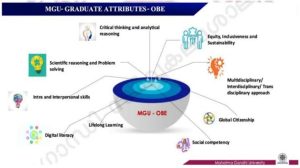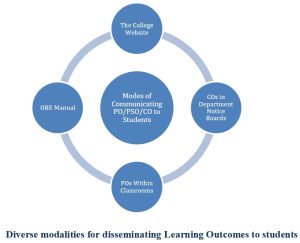Outcome-Based Education (OBE) at Alphonsa College, Pala
Alphonsa College, Pala, has embraced Outcome-Based Education (OBE) as a transformative pedagogical approach, ensuring that our curriculum, pedagogy, and assessment processes align with the attainment of high-order learning outcomes. Through meticulous planning and systematic execution, we have successfully transitioned to an outcome-focused educational paradigm, guided by a dedicated OBE core committee at the college level and coordinators at the departmental level. Currently, the Outcome-Based Education (OBE) learning approach has been implemented to assess the achievement of students enrolled in the undergraduate and postgraduate batches starting from the admissions of 2021.
Graduate Attributes (GA) of Mahatma Gandhi University
The fundamental premise underlying the learning outcomes-based approach to curriculum planning and development is that higher education qualifications are awarded on the basis of demonstrated achievement of outcomes (expressed in terms of knowledge, understanding, skills, attitudes and values) and academic standards expected. The expected learning outcomes are usedas reference points that would help formulate graduate attributes, qualification descriptors, programme outcomes and course outcomes which in turn will help in curriculum planning and development, and in the design, delivery and review of academic programmes. The graduate attributes of Mahatma Gandhi University are:-

GA 1: Critical thinking and Analytical reasoning
Capability to analyze and evaluate evidence, arguments, claims, beliefs on the basis of empirical evidence; identify relevant assumptions or implications; formulate coherent arguments; critically evaluate practices, policies and theories to develop knowledge and understanding; critical sensibility to lived experiences, with self awareness and reflexivity of both self and society.
GA 2: Scientific reasoning and Problem solving
Ability to analyze, interpret and draw conclusions from quantitative/qualitative data and critically evaluate ideas, evidence and experiences from an open-minded and reasoned perspective; capacity to extrapolate from what one has learned and apply their competencies to solve different kinds of non-familiar problems, rather than replicate curriculum content knowledge; and apply one’s learning to real life situations.
GA 3: Multidisciplinary/interdisciplinary/transdisciplinary Approach
Acquire interdisciplinary /multidisciplinary/transdisciplinary knowledge base as a consequence of the learning they engage with their programme of study; develop a collaborative multidisciplinary/interdisciplinary/transdisciplinary- approach for formulate constructive arguments and rational analysis for achieving common goals and objectives.
GA 4: Intra and Interpersonal skills
Ability to work effectively and respectfully with diverse teams; facilitate cooperative or coordinated effort on the part of a group, and act together as a group or a team in the interests of a common cause and work efficiently as a member of a team; lead the team to guide people to the right destination, in a smooth and efficient way.
GA 5: Digital literacy
Capability to use ICT in a variety of learning situations, demonstrate ability to access, evaluate, and use a variety of relevant information sources; and use appropriate software for analysis of data.
GA 6: Global citizenship
Possess knowledge of the values and beliefs of multiple cultures and a global perspective; and capability to effectively engage in a multicultural society and interact respectfully with diverse groups.
GA 7: Social Competency
Ability to contemplate of the impact of research findings on conventional practices, and a clear understanding of responsibility towards societal needs and reaching the targets for attaining inclusive and sustainable development.
GA 8: Equity, Inclusiveness and Sustainability
Appreciate equity, inclusiveness and sustainability and diversity; acquire ethical and moral reasoning and values of unity, secularism and national integration to enable to act as dignified citizens; able to understand and appreciate diversity (caste, ethnicity, gender and marginalization), managing diversity and use of an inclusive approach to the extent possible.
GA 9: Lifelong Learning
Ability to acquire knowledge and skills, including “learning how to learn”, that are necessary for participating in learning activities throughout life, through self-paced and self-directed learning aimed at personal development, meeting economic, social and cultural objectives, adapting to changing trades and demands of work place through knowledge/skill development/reskilling.
Programme Outcomes (PO)
PO 1: Critical thinking and Analytical reasoning
Capability to analyze and evaluate evidence, arguments, claims, beliefs on the basis of empirical evidence; identify relevant assumptions or implications; formulate coherent arguments; critically evaluate practices, policies and theories to develop knowledge and understanding; critical sensibility to lived experiences, with self awareness and reflexivity of both self and society.
PO 2: Scientific reasoning and Problem solving
Ability to analyze, interpret and draw conclusions from quantitative/qualitative data; and critically evaluate ideas, evidence and experiences from an open-minded and reasoned perspective; capacity to extrapolate from what one has learned and apply their competencies to solve different kinds of non-familiar problems, rather than replicate curriculum content knowledge; and apply one’s learning to real life situations.
PO 3: Multidisciplinary/interdisciplinary/transdisciplinary
Approach Acquire interdisciplinary /multidisciplinary/transdisciplinary knowledge base as a consequence of the learning they engage with their programme of study; develop a collaborative multidisciplinary/interdisciplinary/transdisciplinary- approach for formulate constructive
arguments and rational analysis for achieving common goals and objectives.
PO 4: Communication Skills
Ability to express thoughts and ideas effectively in writing and orally; Communicate with others using appropriate media; confidently share one’s views and express herself/himself; demonstrate the ability to listen carefully, read and write analytically, and present complex information in a clear and concise manner to different groups.
PO 5: Leadership Skills
Ability to work effectively and lead respectfully with diverse teams; setting direction, formulating an inspiring vision, building a team who can help achieve the vision, motivating and inspiring team members to engage with that vision, and using management skills to guide people to the right destination, in a smooth and efficient way.
PO 6: Social Consciousness and Responsibility
Ability to contemplate of the impact of research findings on conventional practices, and a clear understanding of responsibility towards societal needs and reaching the targets for attaining inclusive and sustainable development.
PO 7: Equity, Inclusiveness and Sustainability
Appreciate equity, inclusiveness and sustainability and diversity; acquire ethical and moral reasoning and values of unity, secularism and national integration to enable to act as dignified citizens; able to understand and appreciate diversity (caste, ethnicity, gender and marginalization), managing diversity and use of an inclusive approach to the extent possible.
PO 8: Moral and Ethical Reasoning
Ability to embrace moral/ethical values in conducting one’s life, formulates a position/argument about an ethical issue from multiple perspectives, and use ethical practices in all work. Capable of demonstrating the ability to identify ethical issues related to one’s work, avoid unethical behavior.
PO 9: Networking and Collaboration
Acquire skills to be able to collaborate and network with educational institutions, research organizations and industrial units in India and abroad.
PO 10: Lifelong Learning
Ability to acquire knowledge and skills, including “learning how to learn”, that are necessary for participating in learning activities throughout life, through self-paced and self-directed learning aimed at personal development, meeting economic, social and cultural objectives, and adapting to changing trades and demands of work place through knowledge/skill development/reskilling.
Under the guidance of the Institutional Quality Assurance Cell (IQAC), Alphonsa College initiated comprehensive faculty training sessions focused on crafting measurable Program Outcomes (POs), Program-Specific Outcomes (PSOs), and Course Outcomes (COs). Through collaboration with experts from esteemed institutions and participation in workshops and seminars led by renowned educators, faculty members underwent intensive training to align outcomes with the institution’s educational objectives and principles of Outcome-Based Education (OBE) and Bloom’s Taxonomy.
The College Council, recognizing the importance of OBE in delivering student-centered education, spearheaded the formulation of outcomes aimed at equipping learners with essential knowledge, skills, and competencies for success in their chosen fields. Seminars and discussions organized by the IQAC delved into OBE and Bloom’s Taxonomy, empowering faculty members to design outcomes tailored to their respective programs and courses.
A committee of experts, established by the College Council, developed POs aligned with the institution’s Vision and Mission. Departments further refined PSOs and COs through discussions with external subject experts, ensuring alignment with Bloom’s Taxonomy and the curriculum of MG University. These outcomes undergo rigorous review and approval by the IQAC to ensure coherence with the curriculum and educational objectives.
At Alphonsa College, transparency and clarity in communicating learning outcomes to our students are paramount. The Program Outcomes (POs) and Course Outcomes (COs) of our institution are prominently displayed on:
- The college website
- Department Notice Boards
- Within Classrooms
- OBE Manual
- PO display boards in every block of the college.
- PSO and CO display in each department.

This ensures easy access and understanding. During induction programs and introductory classes, students are provided with comprehensive explanations of the expected outcomes of each course and the program as a whole. This empowers them to take ownership of their learning journey and become familiar with the Outcome-Based Education (OBE) approach. Furthermore, examinations are conducted based on OBE principles, further familiarizing students with this educational paradigm.
Mapping of COs against PSOs is conducted using the PSO Articulation Matrix, and COs and POs are mapped using the PO Articulation Matrix, with correlation levels defined as 3 (Substantial), 2 (Moderate), 1 (Low), and No correlation. PO Articulation Matrix and PSO Articulation Matrix clearly illustrates the relationship between each Program Outcome/ Programme Specific Outcome and corresponding course outcomes.
Alphonsa College employs a rigorous methodology for assessing the attainment of learning outcomes. The implementation of Outcome-based education practices, which encompass defining Program Outcomes (POs), calculating attainment levels, and aligning them with Program-Specific Outcomes (PSOs) and Course Outcomes (COs), serves as a robust framework ensuring that students acquire the targeted knowledge and skills in their selected program of study. Through meticulous evaluation of course attainment and soliciting feedback from students, the college not only assesses the effectiveness of its educational delivery but also fosters a culture of continuous improvement. By aligning educational objectives with measurable outcomes, students are provided with clear benchmarks for their academic journey, enhancing their understanding of what is expected and facilitating their progression towards achieving their educational goals.
Moreover, this systematic approach to education enables the college to maintain a dynamic and responsive learning environment. Regular assessment of attainment levels allows for the identification of areas where students may require additional support or where curriculum adjustments may be necessary to better meet their needs. Additionally, gathering feedback from students provides valuable insights into their learning experiences and preferences, enabling the institution to adapt and refine its educational offerings accordingly. Ultimately, the integration of Outcome-based education practices empowers both students and educators to actively participate in the educational process, fostering a collaborative and enriching learning environment that nurtures academic excellence.
Within each course, there exists a spectrum of course outcomes, representing the targeted knowledge and skills that students are expected to attain. These course outcomes serve as the focal points for assessment and are evaluated through two distinct approaches: direct attainment and indirect attainment.
- Direct attainment- where learner performance is measured through Continuous Internal Evaluation strategies like tests, assignments, viva, and MCQs and end Semester Examination.
Computation of Direct PO attainment: 20% of CIE + 80% of the end Semester examination (EE)
- Indirect Attainment– Determined from the course exit surveys, which permit receiving feedback from students on individual COs.
Computation of Overall CO attainment: 90% of Direct CO Attainment+ 10% of indirect CO attainment.
- Course outcome attainment is evaluated on a 3-point scale, where scores above 60% indicate high attainment (3), scores between 40% and 60% indicate medium attainment (2), and scores below 40% indicate low attainment (1).
- CO attainment Target levels
- Level 3: >=60% of the students scoring above 60% marks.
- Level 2: 40-60% of students scoring above 60% marks.
- Level 1: < 40% percentage of students scoring above 60% marks.
- Computation of CO direct attainment of a course
- Attainment of CO of a course = [Wt of CIE (0.2) X Attainment of CO] + [Wt of EE (0.8) X attainment of CO]
- Computation of CO indirect attainment of the course
- [(Level 1 X Of students attempted) +(Level 2 X No. Of students attempted) + (Level 3 X No. Of students attempted)] / Total Number of Students
The Institutional Quality Assurance Cell (IQAC) created and developed an Excel-based tool for measuring attainment.
At Alphonsa College, we believe in continuous improvement driven by data-driven insights. Following the assessment of CO, PSO, and PO attainment levels, detailed analysis reports are prepared at the departmental level. These reports undergo rigorous scrutiny by the college-level OBE committee, which recommends strategic interventions for improvement. Remedial sessions, participative learning methods, and engagement with subject matter experts are among the strategies employed to enhance learning outcomes and ensure continuous growth and development.
Estimation of Programme Outcomes (POs), Programme Specific Outcomes (PSOs) and Course Outcomes (COs)
To benchmark the accomplishments of the principles of the institution, evaluation of the programme outcome attainment is vital. It is the responsibility if IQAC to ensure whether the Programme Outcomes (POs), Programme Specific Outcomes (PSOs) and Course Outcomes (COs) of all departments are achieved. IQAC co-ordinates and monitors the achievement of each of the POs, PSOs and COs through a mapping matrix method. The college has to only analyze the attainment since the Programme Outcomes and Course Outcomes are designed by Mahatma Gandhi University. The teacher’s forum discusses the problems and ambiguous matters in the courses. The attainment of POs, PSOs and COs of the courses are evaluated through direct and indirect estimation methods.
Direct Estimation Method
Here, the internal examinations and assignments are used as the parameters to assess course outcome. The course outcomes are kept as the core based on which the questions for the internal examinations and topics for assignments are framed, and the attainment is assessed from the answer scripts. The attainment of every CO is calculated by taking the average of percentage attainment of particular question. The overall Course Outcome is calculated using the average of percentage attainment of internal assessment and assignment. Working out all CO attainment facilitates the assessment of PO attainment.
Indirect Estimation Method
Feedback collected from passing out students is the parameter used in the indirect estimation method. Since the students are passing out from the college, the feedbacks collected are usually genuine and can be referred for analyzing the CO attainment. The CO attainment further adds to the PO attainment.



